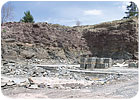
Located in the Pennsylvania Bluestone belt, Meshoppen Stone quarries and fabricates a range of stones, including material from two quarries adjacent to the fabricating operation and offices.

In extracting the stone, the company drills and blasts test holes to find areas with suitable material.
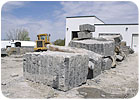
In addition to rubble stone and boulders, the company processes full-sized blocks of material.
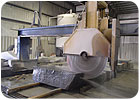
Blocks of stone are cut on large-blade circular saws from Wilson Electric. Included are saws with blade diameters of 11 feet-6 inches, 7 feet-6 inches, 5 feet and 3 feet, among others.
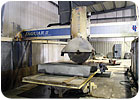
A Jaguar II bridge saw from Park Industries is used for smaller blocks and specialty work.
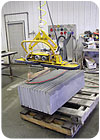
Pieces are moved throughout some areas of the facility using Anver vacuum lifters.
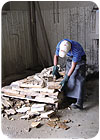
Workers also process stone by hand as needed.
Stone production
Meshoppen Stone owns and leases 12 quarries, and the extraction process is quite different than the methods used for quarrying marble or granite. A quarry site typically has 20 to 40 feet of overburden, which must be removed to get to a bed of flagging, explained Ryan Ruark, William's son, who supervises the production. The company drills and blasts test holes to find areas with suitable material, and they are permitted to work within 3-acre areas at a single time. As crews move to new sections of the site, they refill the land and plant trees to “reclaim†the old excavation areas.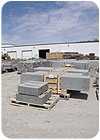
Stone products are available in a broad range of sizes and formats.
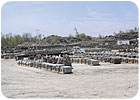
Meshoppen's facility in Pennsylvania maintains a vast inventory of products.
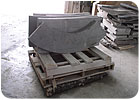
Radius work is sawn by hand, a process that relies on the skill and experience of the worker.
Stone is also flame-finished by hand as needed, depending on the finished product.
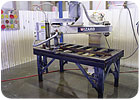
For sills, treads and pool copings, Park Wizard radial arm polishers are used to process the edges.
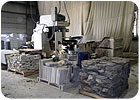
To process thin veneer material, Meshoppen Stone added the ThinStone TXS Stone Veneer Fabrication System from Park Industries. Stone is fed into the machine on a conveyor, and two 40-inch-diameter diamond saw blades plunge cut the stone.
Water used during the fabrication process is recycled through a mud press, and the facilities use 100% recycled water.
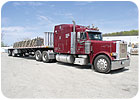
Meshoppen Stone has 25 to 30 company-owned trucks on the road at any given time. This segment of the business has grown to the point that a new division - Meshoppen Transport - was established.